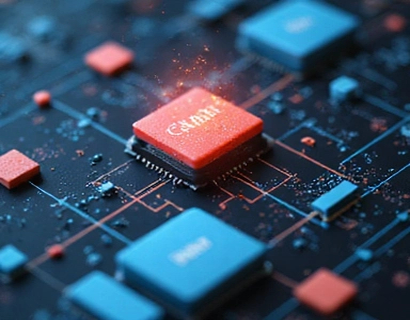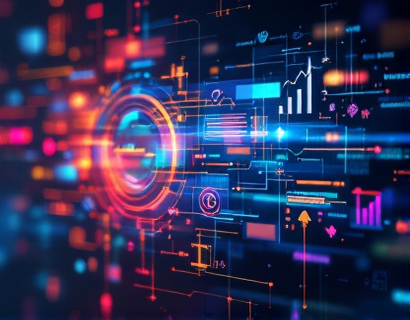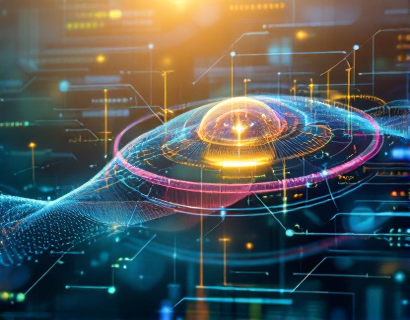Unlocking Enhanced Digital Experiences: The Synergy of Crypto and AI
The intersection of cryptocurrency and artificial intelligence represents a frontier of technological innovation, promising to redefine digital experiences through the convergence of blockchain's decentralized ledger and AI's advanced computational capabilities. This article delves into the transformative impact of this synergy, exploring how next-generation tech solutions are leveraging both technologies to create more secure, efficient, and personalized digital environments. For tech enthusiasts and early adopters, this exploration offers a comprehensive look at the future of digital innovation.
Understanding the Basics: Cryptocurrency and Artificial Intelligence
To fully appreciate the merging of cryptocurrency and AI, it's essential to first understand the fundamental concepts of each. Cryptocurrency, exemplified by Bitcoin and Ethereum, is a digital or virtual currency that uses cryptography for security and operates on a decentralized network, eliminating the need for central authorities like banks. The underlying technology, blockchain, ensures transparency, immutability, and security through a distributed ledger system.
Artificial Intelligence, on the other hand, encompasses a range of technologies designed to simulate human intelligence in machines that are programmed to think and learn. Key components include machine learning, natural language processing, and computer vision. AI's ability to analyze vast amounts of data, identify patterns, and make predictions or decisions autonomously makes it a powerful tool across various industries.
The Convergence: How Crypto and AI Complement Each Other
The combination of cryptocurrency and AI creates a powerful synergy. Blockchain's decentralized and secure nature provides an ideal platform for AI applications that require trust, transparency, and data integrity. Conversely, AI's advanced data processing and analytical capabilities enhance the functionality and efficiency of blockchain-based systems. This mutual reinforcement paves the way for innovative solutions that leverage the strengths of both technologies.
One of the primary areas where crypto and AI intersect is in the realm of smart contracts. Smart contracts are self-executing contracts with the terms of the agreement directly written into code. When combined with AI, these contracts can become more dynamic and intelligent, capable of adapting to changing conditions and making decisions based on real-time data analysis. This fusion not only increases efficiency but also reduces the risk of fraud and errors.
Enhanced Security Through AI-Driven Cryptography
Security is a paramount concern in the digital world, and the integration of AI into cryptographic systems offers significant advancements. Traditional cryptographic methods rely on mathematical algorithms to secure data, but these can be vulnerable to sophisticated attacks. AI enhances security by continuously monitoring and analyzing network activity to detect and respond to threats in real-time.
Machine learning algorithms can identify unusual patterns that may indicate a security breach, allowing for proactive measures to be taken. Additionally, AI can generate more complex and adaptive cryptographic keys, making it harder for malicious actors to compromise the system. This AI-driven approach to cryptography ensures that blockchain networks remain robust and resilient against evolving cyber threats.
Decentralized AI: A New Paradigm
Decentralized AI, or DAI, represents a groundbreaking application of blockchain and AI. Unlike traditional AI models that rely on centralized servers for data processing and storage, DAI distributes these functions across a network of nodes. This decentralization not only enhances privacy and data ownership but also improves the scalability and reliability of AI systems.
In a DAI framework, AI models are trained and executed on multiple nodes, with data remaining on the local devices of users. This approach minimizes the risk of data breaches and central points of failure. Moreover, token-based incentives can motivate participants to contribute their computational resources, creating a collaborative ecosystem that benefits all involved. This model aligns with the principles of blockchain, promoting a more democratic and transparent digital environment.
Personalized User Experiences Through AI and Crypto
One of the most exciting applications of combining AI and cryptocurrency is the creation of personalized digital experiences. AI algorithms can analyze user behavior, preferences, and interactions to deliver tailored content, recommendations, and services. When integrated with blockchain, these experiences can be secured and monetized in novel ways.
For instance, a decentralized platform can use AI to curate a personalized news feed or entertainment playlist, with users earning tokens for engaging with content or providing valuable insights. These tokens can then be used within the ecosystem or exchanged for other digital assets, creating a seamless and rewarding user experience. This model not only enhances user engagement but also fosters a community-driven approach to content creation and consumption.
Tokenized Identities and Decentralized Identity Management
Identity verification and management are critical components of the digital landscape, and the fusion of AI and cryptocurrency offers innovative solutions. Decentralized identity (DID) systems use blockchain to give users control over their personal data, ensuring privacy and security. AI enhances these systems by providing advanced authentication methods and fraud detection.
AI-driven biometric verification, such as facial recognition or voice authentication, can be integrated into DID frameworks to create robust and user-friendly identity management solutions. Additionally, AI can analyze transaction patterns and behavior to detect and prevent identity theft and fraud, ensuring that users' digital identities remain secure. This combination empowers individuals while maintaining the integrity of digital interactions.
Automated Market Operations and DeFi
Decentralized Finance (DeFi) is a rapidly growing sector that leverages blockchain to provide financial services without traditional intermediaries. AI plays a crucial role in optimizing DeFi protocols, enhancing their efficiency and accessibility. AI algorithms can analyze market data, predict price movements, and automate trading strategies, allowing users to make informed decisions and maximize returns.
Smart contracts powered by AI can execute complex financial operations with precision and speed, reducing transaction costs and increasing transparency. This synergy is particularly evident in decentralized exchanges (DEXs), where AI-driven order matching and liquidity provision improve the trading experience. The result is a more efficient, user-friendly, and secure financial ecosystem that is accessible to a global audience.
Challenges and Considerations
While the potential of combining cryptocurrency and AI is vast, several challenges must be addressed to fully realize this vision. One of the primary concerns is regulatory compliance. The decentralized nature of blockchain and the innovative use of AI can complicate legal frameworks, requiring clear guidelines and standards to ensure responsible development and deployment.
Another challenge is the technical complexity involved in integrating these technologies. Developers must possess a deep understanding of both blockchain and AI to create robust and scalable solutions. Additionally, ensuring user privacy and data security remains a top priority, as the combination of AI and cryptocurrency can potentially expose sensitive information if not properly managed.
Future Prospects: The Next Evolution of Digital Technology
The future of digital technology is increasingly shaped by the convergence of cryptocurrency and AI. As these fields continue to evolve, we can expect to see more sophisticated and integrated solutions that enhance various aspects of digital life. From enhanced cybersecurity and personalized user experiences to decentralized financial systems and innovative identity management, the possibilities are vast.
For tech enthusiasts and early adopters, this intersection offers a wealth of opportunities to explore and contribute to the development of next-generation tech solutions. By staying informed and engaged, individuals can play a pivotal role in shaping the future of digital innovation, ensuring that it is secure, inclusive, and beneficial for all.











































